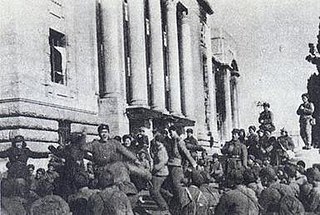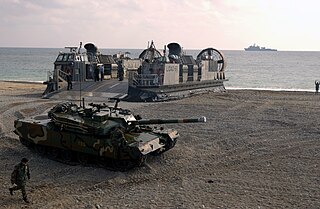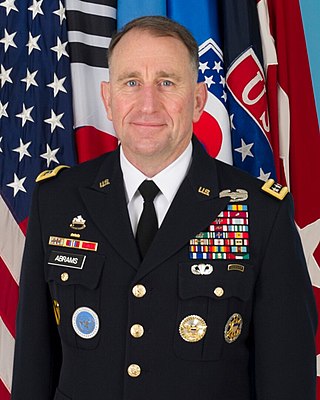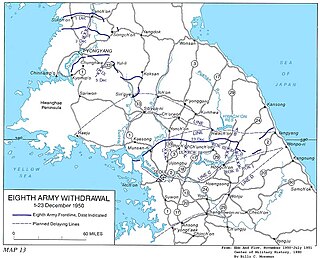
The Republic of Korea Armed Forces, also known as the ROK Armed Forces, are the armed forces of South Korea. The ROK Armed Forces is one of the largest and most powerful standing armed forces in the world with a reported personnel strength of 3,600,000 in 2022. As a result of its size and equipment, it is ranked the 6th most powerful military on the planet by the Global Firepower Index as of 2023.

The Eighth Army is a U.S. field army which commands all United States Army forces in South Korea. It is headquartered at the Camp Humphreys in the Anjeong-ri of Pyeongtaek, South Korea. Eighth Army relocated its headquarters from Yongsan to Camp Humphreys in the summer of 2017. It is the only field army in the U.S. Army. It is responsible to United States Forces Korea and United States Army Pacific.

X Corps was a corps of the United States Army in World War II and the Korean War.

IX Corps was a corps of the United States Army. For most of its operational history, IX Corps was headquartered in or around Japan and subordinate to US Army commands in the Far East.
The Republic of Korea Presidential Unit Citation is a military unit award of the government of South Korea that may be presented to South Korean military units, and foreign military units for outstanding performance in defense of the Republic of Korea. In recognition of allied military service to South Korea during the Korean War, all United States military departments were authorized the unit award for that period.

The Hungnam evacuation, also known as the Miracle of Christmas, was the evacuation of United Nations (UN) forces and North Korean civilians from the port of Hungnam, North Korea, between 15 and 24 December 1950 during the Korean War. As part of the fighting withdrawal of UN forces against the People's Volunteer Army (PVA) during the Battle of the Chosin Reservoir, they abandoned some 59,000 square kilometers of North Korean territory to enemy forces and retreated to Hungnam from where they were evacuated to South Korea.

The Capital Mechanized Infantry Division, also known as Fierce Tiger Division, is currently one of the six mechanized infantry divisions in the Republic of Korea Army. It is part of the VII Maneuver Corps, tasked with covering approaches to Seoul from North Korea and counterattack operations.

The United States Army Aviation Branch is the administrative organization within the United States Army responsible for doctrine, manning and configuration for all army aviation units.

Ann Elizabeth Dunwoody is a retired general of the United States Army. She was the first woman in United States military and uniformed service history to achieve a four-star officer rank, receiving her fourth star on November 14, 2008.
An interpreter officer or army interpreter is a commissioned officer of an armed force, who interprets and/or translates to facilitate military operation. Interpreter officers are used extensively in multinational operations in which two or more countries that do not share a common language are undertaking a joint operation, or expeditionary missions in which the communication with the local population is crucial but limited by lack of language proficiency among the expeditionary force personnel. Interpreter officers also work in the intelligence gathering and analysis though in many countries, civilian analysts are used instead of the officers in active duty.

The structure of the United States Army is complex, and can be interpreted in several different ways: active/reserve, operational/administrative, and branches/functional areas.

The Third Battle of Seoul, also known as the Chinese New Year's Offensive, the January–Fourth Retreat or the Third Phase Campaign Western Sector, was a battle of the Korean War, which took place from December 31, 1950, to January 7, 1951, around the South Korean capital of Seoul. In the aftermath of the major Chinese People's Volunteer Army (PVA) victory at the Battle of the Ch'ongch'on River, the United Nations Command (UN) started to contemplate the possibility of evacuation from the Korean Peninsula. Chinese Communist Party chairman Mao Zedong ordered the Chinese People's Volunteer Army to cross the 38th Parallel in an effort to pressure the UN forces to withdraw from South Korea.

Foal Eagle is a combined field training exercise (FTX) conducted annually by the Republic of Korea Armed Forces and the United States Armed Forces under the auspices of the Combined Forces Command. It is one of the largest military exercises conducted annually in the world. Foal Eagle has been a source of friction with the government of Democratic People's Republic of Korea (DPRK) and domestic ROK critics.

Robert Bruce Abrams is a retired four-star general in the United States Army who last served as the commander of United States Forces Korea. He concurrently served as the commander of United Nations Command and commander of R.O.K.-U.S. Combined Forces Command. He previously served as the 22nd commanding general of United States Army Forces Command from August 10, 2015 to October 17, 2018. He is a 1982 graduate of the United States Military Academy where he was commissioned as an armor officer. During his years of active service, he has held command and staff positions across the Army and joint community in Germany, the United States, Southwest Asia and South Korea. Abrams comes from a family of career military officers. His father was former Army Chief of Staff General Creighton W. Abrams Jr., and both of his elder brothers, Creighton and John, were Army general officers.
Busan Citizens Park is a former Imperial Japanese Army base and United States Army camp located in the Busanjin District of the city of Busan, South Korea. The Camp occupying 133-acre (540,000 m2) of prime real estate was closed on 10 August 2006 and handed back to the Busan city government. It was redeveloped as the Busan Citizens Park and opened on 1 May 2014.

Paul Joseph LaCamera is a United States Army four-star general and infantry officer who serves as commander of the United Nations Command, ROK/US Combined Forces Command and United States Forces Korea since July 2, 2021. LaCamera most recently served as commanding general of United States Army Pacific from November 18, 2019 to June 3, 2021. He previously served as the commanding general of XVIII Airborne Corps. His other assignments include the commander of Combined Joint Task Force – Operation Inherent Resolve and as the commanding general of the 4th Infantry Division. LaCamera is a native of Westwood, Massachusetts. He was nominated to replace General Robert Abrams as the next commander of United Nations Command, R.O.K.-U.S. Combined Forces Command, and U.S. Forces Korea, on December 2, 2020, however his nomination was returned to the president on January 3, 2021, without action. He was renominated on April 27, 2021.
The US Army Small Ships Section was an improvised civilian fleet mobilized by Douglas MacArthur to provide logistical support to Allied Operations in the Pacific War. Between 1942 and 1945, over 4,372 Allied Merchant seaman served aboard commandeered civilian vessels "from Buna to the Philippines" - providing critical logistics under enemy fire.

The UN retreat from North Korea was the withdrawal of United Nations (UN) forces from North Korea that took place from 2–25 December 1950.

The 203rd Military Intelligence Battalion (Technical Intelligence) is the sole technical intelligence (TECHINT) collection and foreign material exploitation unit of the United States Army, and an army reserve battalion within Military Intelligence Readiness Command's Theater Support Command. The 203rd obtains and exploits captured enemy materials, maintains one of the premier test and evaluation inventories of adversary equipment and weaponry in the US military, and supports specialized tasking including counter-terrorism, special reconnaissance, and direct action missions. Much of the units work collaborates closely with the National Ground Intelligence Center. The battalion's intelligence products provide TECHINT support to INSCOM, the Defense Intelligence Enterprise, the broader US Intelligence Community, the Five Eyes, NATO, and foreign allies and partners.

James E. Kraft Jr. is a retired United States Army major general who was the Deputy Commanding General of the XVIII Airborne Corps. Previously, he was the Director of Operations of the United Nations Command, ROK/US Combined Forces Command and United States Forces Korea.
















